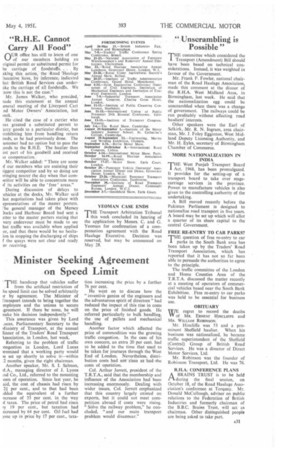• Minister Seeking Agreement on Speed Limit
Page 33

If you've noticed an error in this article please click here to report it so we can fix it.
THE handicap that vehicles suffer from the artificial restriction of he speed limit can be solved arbitrarily or by agreement. The Minister of Fransport intends to bring together the :mployers and the unions to secure ,greement. If there be none, he will nake his decision independently."
This assurance was given by Lord _ucas, Parliamentary Secretary to the vlinistry of Transport, at the annual !inner of the Traders' Road Transport kssociation, in London, last week.
Referring to the problem of traffic ongestion in London, Lord Lucas nomised that a working party would oe set up shortly to solve it—within 2 months, given the right chairman. Another speaker, Mr. S. I. Salmon, 0.A., managing director of J. Lyons Ind Co., Ltd., referred to the mounting osts of operation. Since last year, he aid, the cost of chassis had risen by 24 per cent., and to that had been Ldded the equivalent of a further ncrease of 33 per cent. in the way of taxes. The price of petrol had risen ty 19 per cent., but taxation had ncreased by 64 per cent. Oil fuel had one up in price by 17 per cent., taxa tion increasing the price by a further 76 per cent.
He went on to discuss how the "inventive genius of the engineers and the adventurous spirit of directors" had reduced the impact of this rise in costs on the price of finished goods, He referred particularly to bulk handling, the use of pallets and mechanical handling.
Another factor which affected the price of commodities was the growing traffic congestion. In the case of his own concern, an extra 20 per cent. had to be added to the time that used to be taken for journeys through the West End of London. Nevertheless, distribution costs had not risen as had-the costs of operation.
Col. Arthur Jerrett, president of the T.R.T.A., said that the membership and influence of the Association had been increasing enormously. Dealing with wider issues, Col. Jerrett emphasized that this country largely existed on exports, but it could not meet competition abroad if costs were rising. "Salve the railway problem," he concluded, "and our main transport problem would disappear."




































































































